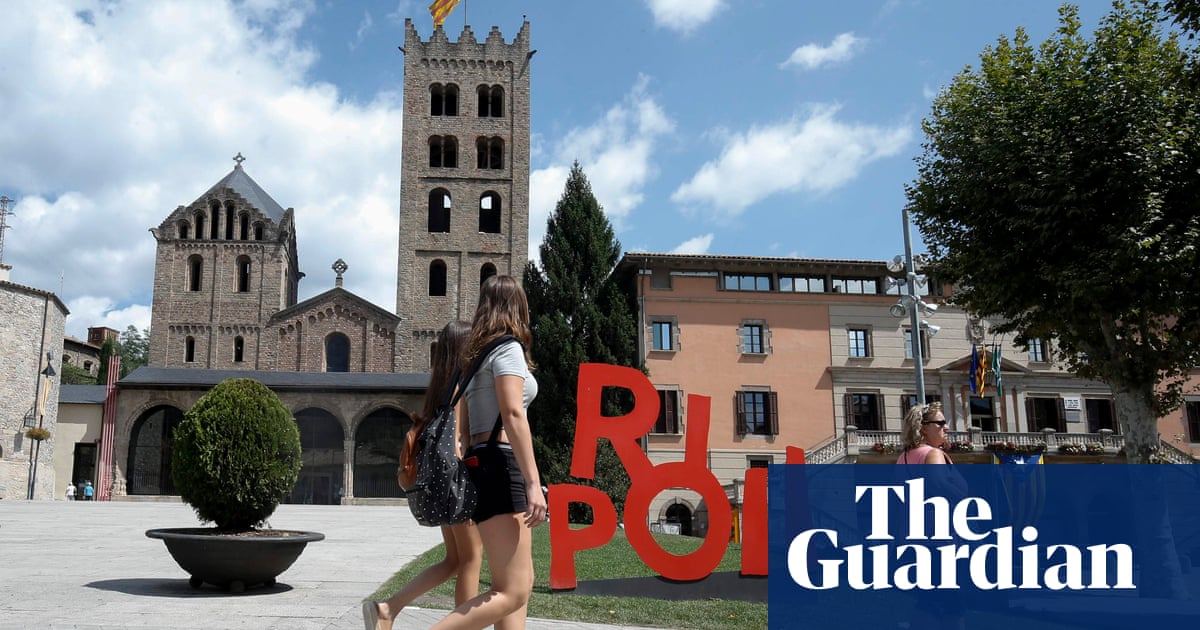
The European Commission and the Spanish government are looking into claims that a far-right town council in Catalonia is preventing immigrants from accessing basic public services by making it hard for them to join the municipal register.
The register, known as empadronamiento, is open to everyone in Spain, regardless of immigration status, and is the point of access for public healthcare, education and other vital services.
But since Sílvia Orriols, the leader of the far-right Aliança Catalana, won the mayoral election in the Catalan town of Ripoll last May, there have been reports of immigrants having their empadronamiento applications held up or queried.
Obtaining the document is normally a formality, but Fazeel – who was born in Pakistan but has lived in Spain for 20 years and now runs an electronics and mobile phone business in Ripoll – said the process in the town had become fraught.
“After living in Barcelona, when I returned to Ripoll I had all sorts of problems getting registered, even though I’m a homeowner,” he said.
“I had two visits from the police who said the information I’d provided didn’t correspond with my situation. When I asked what didn’t correspond, they refused to tell me.”
Fazeel said that while he had eventually received his empadronamiento six weeks later, he had heard of other people struggling to get on the register.
Orriols denies claims that council staff have been instructed to stall immigrants’ applications.
“Everyone is treated the same; the procedure is the same for everyone,” she told the Guardian. “The police are only involved when there is a suspicion that the property is over-occupied.”
Given that the only documentation required to register is proof of residence and valid ID, it’s not clear how such a suspicion would arise.
The claims are now being examined by both the European Commission and the Spanish government.
“The commission has contacted the Spanish authorities to gather more information on this matter,” said a commission spokesperson. “Based on the information gathered, the commission will assess the need for further actions, as appropriate.”
The central government’s delegate to Catalonia has warned that the withholding or delay of empadronamiento could “constitute a violation of existing laws”, and has asked for explanations within 20 days.
Orriols, who has faced frequent accusations of Islamophobia, told the Guardian she believed Muslims could never become Catalans because “they don’t integrate with the country’s culture and values. In my opinion, the customs and values of Islam are incompatible with being Catalan.”
While the mayor remains a political outlier, immigration is once again returning to the political fore as Spain prepares for June’s European elections.
Spain’s socialist prime minister, Pedro Sánchez, secured a second term in office after last July’s inconclusive general elections by offering a controversial amnesty to Catalan separatists in return for the support of the two main regional pro-independence parties: the hardline, centre-right Junts party and the more moderate Catalan Republican Left (ERC).
Junts, which is led by the former Catalan regional president Carles Puigdemont, has made it very plain that it intends to exact as much as it can in return for its continuing support of Sánchez’s administration. Congress is voting on the profoundly divisive amnesty bill on Tuesday.
Earlier this month, Sánchez obtained Junts’s backing during the first key debate of the new legislature by promising Catalonia a far greater say in migration matters. Jordi Turull, Junts’s general secretary, has recently linked immigration with crime, saying Catalonia needs to be able to deport immigrants who reoffend.
Although Junts hailed the concession as a “comprehensive” handover of migration powers, the prime minister has insisted that the central government will continue to manage borders and decide policy.
Sánchez’s latest concession raised eyebrows – not least because the prime minister has previously attacked Junts for its nationalism and alleged xenophobia.
Six years ago, Sánchez compared Quim Torra – the Junts MP who was then serving as Catalan president and a man with a long history of vehemently anti-Spanish pronouncements – to the far-right French politician Marine Le Pen. Three years later, the socialist leader accused some Junts candidates of spouting “hatred and xenophobia” reminiscent of the discourse of Spain’s far-right Vox party.
The prime minister’s decision to cede to Junts’s demands was condemned by Alberto Núñez Feijóo, the leader of the conservative opposition People’s party (PP).
“Do Spain’s leftwing voters agree with immigration powers being transferred to a party [Sánchez] has called xenophobic?” asked Feijóo. “You can’t be that cynical.”
Junts’s rhetoric has also been criticised by the ERC, which governs Catalonia. The region’s interior minister, Joan Ignasi Elena, recently said Junts was trying to use the logic and language of the far-right to stop its voters shifting their allegiances to Orriols’s Aliança Catalana.
Meritxell Serret, the Catalan head of foreign affairs, described Junts’s association of crime and immigration as a simplistic and statistically incorrect, adding that it was a political error that “only serves to encourage far-right and xenophobic parties”.
She added: “It’s obvious that Catalonia has become a much more diverse society and this involves both challenges and opportunities, but what we need is a constructive discussion.”
Junts are not the only ones facing accusations of seeking to exploit the issue of immigration.
Isabel Díaz Ayuso, the populist PP president of the Madrid region, recently appeared to link migrants in a reception centre near Madrid with a series of sexual assaults in the area.
Her comments were swiftly dismissed by the central government’s delegate to the region, who said police were not investigating any links between the attacks and migrants in the centre.
“Mixing migration and insecurity is extremely serious,” said Francisco Martín. “These messages are dangerous, create alarm and go against coexistence. I naturally condemn any such comments, especially when they’re not supported by facts.”











